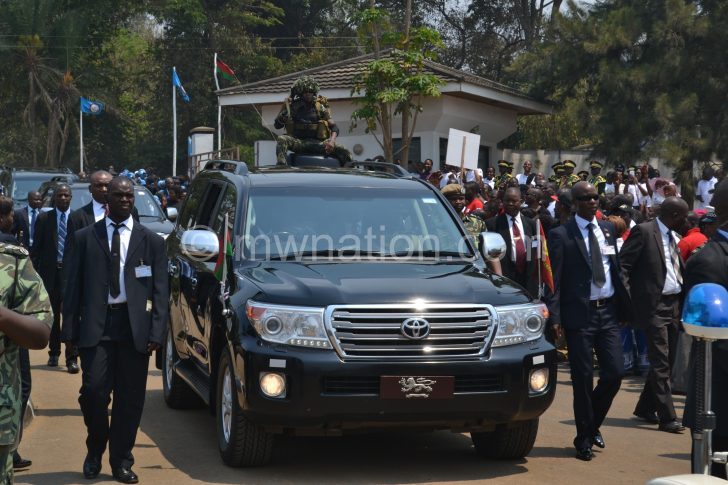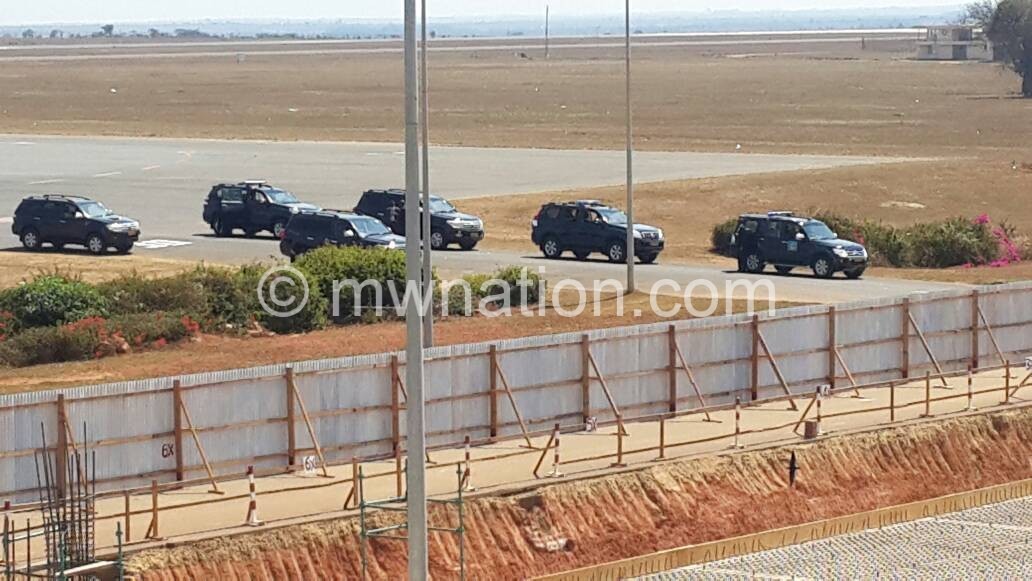Govt moves to curb spending
The Office of the President and Cabinet (OPC) has moved to reduce unnecessary expenditures incurred through travel and use of government vehicles following the poor performance of the 2017/18 National Budget.
In a circular dated March 23 2018 addressed to controlling officers and heads of departments, Chief Secretary to the Government Lloyd Muhara said the expenditure control measures and fleet management policy will be implemented immediately.

The measures have also not extended to the presidency where when the Head of State travels to meetings such as the United Nations General Assembly takes with him huge entourages and uses a chartered jet.
However, the measures fall short of outlining the value of the cost-saving to the government if the ban on business class travel is only limited to flights that are less than three hours long which in this case relates to Southern African destinations only.
Questions have also arisen on the significance of the 10 percent reduction in fuel allowances considering that some government officials such as principal secretaries (PSs) and judges of the High Court of Malawi and Malawi Supreme Court of Appeal receive at least 500 litres of fuel a month.
The measures have restricted business class travel to heads of the three arms of government, the Speaker, the Chief Justice and the Chief Secretary to the Government while PSs, chief directors and chief executives of major statutory corporations will have to seek approval to travel business class for trips longer than three hours.
To address the ever rising wage bill, a hire and promotions freeze has been effected except for special services such as the health sector.
This follows the K5.7 billion spent on recruitment of officers for the Malawi Defence Force (MDF) and Malawi Police Service (MPS) initially not planned for in the 2017/18 National Budget.
The circular adds: “Top-up allowances for trips fully funded by donors are suspended with immediate effect. Government has, with immediate effect, cut fuel allowance by 10 percent across the board.”
The decision comes against a background of a 2012/13 assessment of the budget by Economics Association of Malawi (Ecama) which found that the government spent a whopping K17 billion servicing close to 3 000 vehicles, half of which was spent on fuel and maintenance and more than 50 percent on allowances for drivers.
The Ecama analysis also found that the public service had 706 officers entitled to official vehicles for personal use of which 94 had fuel allocations of 500 litres per month each while the remaining were entitled to 250 litres per month.
The circular has also outlined some fleet management policies which have previously not worked such as restricting use of government vehicles on weekends and public holidays.
The policy has gone further to put in place refuelling controls for the vehicles, limiting fuel to be used per week and empowering controlling officers to authorise exceeding of the limits.
“Any movement of government vehicles outside working hours, weekends and public holidays should be authorized, in writing, personally by the controlling officer or head of department,” the circular reads.
Other measures include quarterly submission of Motor Vehicle Returns to the Chief Secretary to the Government copied to the Auditor General and the Accountant General.
In an interview, Secretary to the Treasury Ben Botolo confirmed the need for such control measures to be effected, but argued that the changes could not extend to matters that touch on conditions of service of public servants.
He said the President had already started adhering to travel cuts by attending only those meetings that were very important while foreign travel was banned for other government officials unless fully funded by others or with special permission from the Chief Secretary.
Said Botolo: “The whole idea was to examine savings that could be made in the budget. It has been observed many times that expenditure on travel such as allowances, fuel and vehicle maintenance eat into the allocations of government ministries and departments hence the focus.”
Commenting on the blurred lines between official use of government resources against political or personal resources, particularly with regard to Cabinet ministers, Botolo said there would be a strict monitoring that ministers should only use their allocated vehicles and fuel not those on the pool.
He also said there were instances where 10 people from the ministry would travel separately while going in the same direction translating to high consumption of fuel and wear and tear to government vehicles.
On his part, economics professor Ben Kaluwa agreed with Botolo that several studies calculating the cost of fuel and vehicle maintenance as well as travel on the overall government expenditure established wastefulness.
He said: “It [study] found that as much as 50 percent [of government expenditure] was ending up in travel and fuel use especially was highlighted. To the extent that this is going to be implemented strongly, it is a good move because we have mentioned several times that there should be strict controls on this.”
In 2016, the Ministry of Finance engaged consultants tasking them with coming up with a framework that would help the government to standardise procurement of vehicles due to the difficult economic situations in the country.
The consultants would come up with recommendations on fleet management, disposal and ownership that is consistent with the Malawi economy.
However, Kaluwa has said the government should go further to drastically cut allowances related to travel and change the requirement of the high engine capacities of the vehicles for some officers like ministers and PSs.





